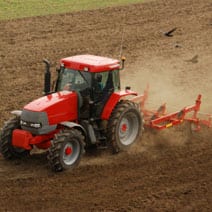 Agriculture in the 21st Century is a very different industry now in comparison to even 50 years ago.
Agriculture in the 21st Century is a very different industry now in comparison to even 50 years ago.
Agriculture has been for many generations at the centre of Irish life and continues to be one of the strongest industries in Ireland. Undoubtedly the biggest and most influential change to agriculture was when Ireland joined the EU (formerly the EEC). This has directly impacted not only on types of agricultural but also the various elements in the operation of a farming enterprise in Ireland today.
In today’s terms Agriculture (including Forestry) is not just farming, it is a business. It is a business and as such it must be run in a cost effective manner to be sustainable and profitable.
As with all enterprises, farms must be managed as a business whether it is in the tillage, dairy, dry-stock, forestry or the food supply sector. This puts a greater demand on farmers to develop both their management skills and farms. There is constant evolution of new regulations and technologies which are coming to the forefront. To grow as a successful enterprise these regulations and technologies must be embraced and complied with. These can be seen as a challenge but can also present opportunities to diversify into niche markets.
Compliance
In the agricultural industry there have been profound changes brought about by way of the introduction of compliance with a range of environmental, food safety and animal welfare standards
To run a successful agricultural business, not only must one must be aware of the various regulations and laws relating to the agricultural industry, but farmers must also adhere to and maintain a high standard of compliance with relevant regulations. If the required standards are not met this may well result in payments (entitlements) being withheld either partially or entirely.
It is therefore paramount that each and every person, body and party is fully aware of all Statutory Management Requirements which come under the umbrella of Cross Compliance and also the impact of non-compliance.
Farm partnerships
Agricultural enterprises have also changed in terms of their size. Farming on a small scale is becoming less common with a drop in the number of farms which are now smaller than 25 hectares. This is somewhat due to an increase in the number of “Farm Partnerships” which are forming.
A Farm Partnership is where two or more farmers join property, funds, knowledge and effort. Various benefits can be gained by this. As the saying goes “Many hands make light work”!!
As recently as December 2012, Farm Partnerships were limited to just Dairy Partnerships. However, since the Budget of December 2012 the Farm Partnership Scheme has been expanded to include farm partnerships involved in enterprises such as beef, sheep and tillage.
By adapting to this new diversity of agricultural enterprise, farmers who farm in partnership are most likely to succeed into the future. The success of Farm Partnerships can be linked with factors such as better opportunities to increase the extent of the business, better management decisions and an improved skills mix.
Farm Purchasing Groups
In the past farmers were members of groups known as Co-ops. This concept has now moved from a wide to a more concentrated group in terms of members and the type of agricultural business they are involved in.
These Groups are set up in local communities with the purpose of reducing the cost of purchasing goods such as fertilizer or the purchase of animal food stuffs. By purchasing these items in bulk quantities, it provides huge bargaining power to the Group as a whole rather than individuals.
The key concept of these Farm Purchasing Groups is the ability to negotiate more competitive prices with suppliers. Of course, confidentiality remains a key component from both the members’ and suppliers’ point of view.
In that respect it is vital that key conditions are included in any contract negotiated between both the supplier and the Purchasing Group. It is vital that all parties involved are fully aware of and understand the terms attaching to such agreements.
As can be seen from the above, the agricultural industry has progressed to a more regulated and diverse business enterprise. Agriculture is an integral player in the Irish Economic Industry. It is a very competitive sector.
In order to survive, grow and strengthen a business in the agricultural industry, management standards must keep up with ever evolving laws and regulations and appropriate decisions must be taken where change is required.






